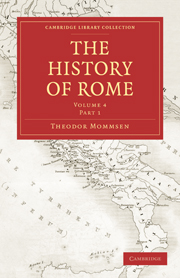Book contents
- Frontmatter
- PREFATORY NOTE
- Contents
- BOOK FIFTH THE ESTABLISHMENT OF THE MILITARY MONARCHY
- CHAPTER I MARCUS LEPIDUS AND QUINTUS SERTORIUS
- CHAPTER II RULE OF THE SULLAN RESTORATION
- CHAPTER III THE FALL OF THE OLIGARCHY AND THE RULE OF POMPEIUS
- CHAPTER IV POMPEIUS AND THE EAST
- CHAPTER V THE STRUGGLE OF PARTIES DURING THE ABSENCE OF POMPEIUS
- CHAPTER VI RETIREMENT OF POMPEIUS AND COALITION OF THE PRETENDERS
CHAPTER V - THE STRUGGLE OF PARTIES DURING THE ABSENCE OF POMPEIUS
Published online by Cambridge University Press: 10 November 2010
- Frontmatter
- PREFATORY NOTE
- Contents
- BOOK FIFTH THE ESTABLISHMENT OF THE MILITARY MONARCHY
- CHAPTER I MARCUS LEPIDUS AND QUINTUS SERTORIUS
- CHAPTER II RULE OF THE SULLAN RESTORATION
- CHAPTER III THE FALL OF THE OLIGARCHY AND THE RULE OF POMPEIUS
- CHAPTER IV POMPEIUS AND THE EAST
- CHAPTER V THE STRUGGLE OF PARTIES DURING THE ABSENCE OF POMPEIUS
- CHAPTER VI RETIREMENT OF POMPEIUS AND COALITION OF THE PRETENDERS
Summary
With the passing of the Gabinian law the parties in the capital changed positions. From the time that the elected general of the democracy held in his hand the sword, his party, or what was reckoned such, had the preponderance in the capital. The nobility doubtless still stood in compact array, and still as before there issued from the comitial machinery none but consuls who according to the expression of the democrats were already designated to the consulate in their cradles; to command the elections and break down the influence of the old families over them was beyond the power even of the regents. But unfortunately the consulate, at the very moment when they had got the length of virtually excluding the “new men” from it, began itself to grow pale before the newly-risen star of the exceptional military power. The aristocracy felt this, though they did not exactly confess it; they gave themselves up as lost. Except Quintus Catulus, who with honourable firmness persevered at his far from pleasant post as champion of a vanquished party down to his death (694), no Optimate could be named from the highest ranks of the nobility, who sustained the interests of the aristocracy with courage and steadfastness.
- Type
- Chapter
- Information
- The History of Rome , pp. 155 - 186Publisher: Cambridge University PressPrint publication year: 2010First published in: 1866

